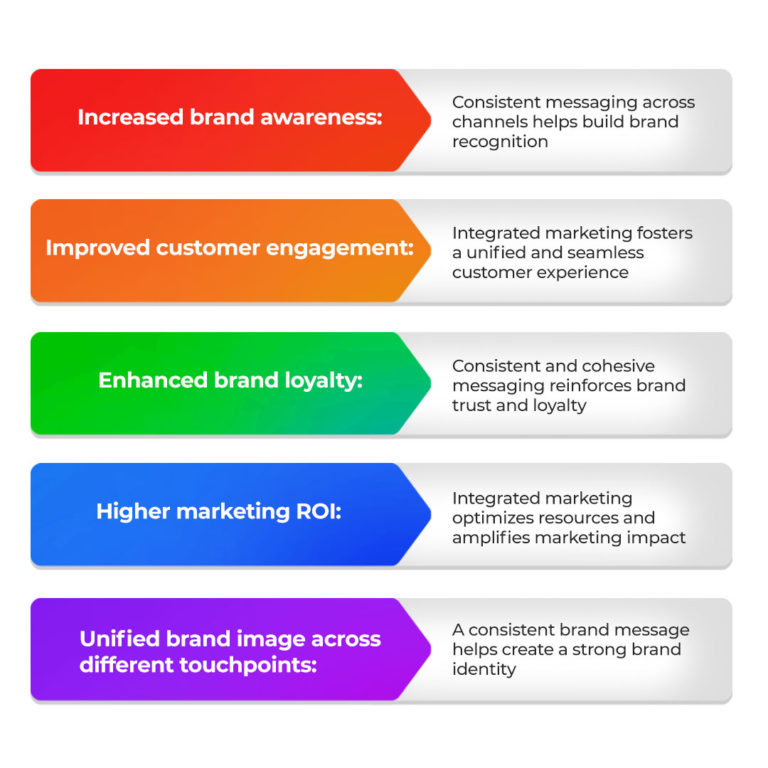
Integrated Marketing as the key 'Mantra' for Enterprises
Driving Success through Standardization and Alignment
In today’s hyper-connected world, where consumers are bombarded with countless marketing messages across various channels, it has become vital for enterprises to adopt a marketing approach that truly works! ‘Integrated marketing’ serves as a powerful ‘mantra’ that enables businesses to streamline their messaging, align marketing activities with larger business objectives, and maximize the impact of their marketing efforts. But what exactly is integrated marketing? In this blog, we will delve into the world of integrated marketing, exploring its definition, benefits, and key principles.
What is Integrated Marketing?
Integrated marketing, also known as integrated marketing communications (IMC), refers to the practice of coordinating and integrating various marketing channels and strategies to deliver a consistent, unified, and seamless brand experience to the target audience. It involves aligning all marketing efforts of an enterprise across different platforms and mediums to create a consistent brand message, maximize the impact of marketing campaigns, and enhance overall customer experience.
In an integrated marketing strategy, different marketing channels such as advertising, public relations, direct marketing, social media, content marketing, and more, are strategically combined to work together cohesively. The goal is to create a unified and synergistic approach that amplifies the impact of marketing efforts and ensures that the brand message is consistent across all touchpoints.
Benefits of Integrated Marketing for Enterprises:
By adopting an integrated marketing approach, organizations can create a more impactful and memorable presence in the market, effectively reach their target audience, and drive business success. Integrated marketing offers numerous benefits, including:

Let us now explore the significance of integrated marketing and the key components that contribute to its success-
Understanding Integrated Marketing:
Integrated marketing is a strategic approach that harmonizes all marketing efforts across different channels and touchpoints to deliver a consistent and seamless brand experience. It involves breaking down silos between various marketing disciplines and integrating them into a unified strategy. By doing so, enterprises can effectively communicate their brand message, strengthen their market presence, and enhance customer engagement.
Standardization of Messaging:
A fundamental aspect of integrated marketing is the standardization of messaging. Consistency in brand messaging across all channels and platforms is crucial to building brand recognition, trust, and loyalty. By establishing a clear and coherent brand voice, enterprises can ensure that their messaging resonates with their target audience, regardless of the medium through which it is conveyed. This consistency helps in creating a strong brand identity and reinforces the desired brand perception in the minds of consumers.
Understanding Larger Business Objectives:
Integrated marketing goes beyond individual marketing campaigns and tactics. It requires a deep understanding of the larger business objectives and goals. By aligning marketing strategies with broader organizational goals, enterprises can ensure that their marketing efforts contribute directly to the success of the business. This alignment ensures that marketing activities are not carried out in isolation but are integrated into the overall business strategy, resulting in a cohesive and impactful approach.
Aligning Marketing Activities:
Another critical aspect of integrated marketing is aligning marketing activities with the larger business objectives. This involves synchronizing various marketing channels, such as traditional advertising, digital marketing, public relations, social media, and more, to create a unified and consistent customer experience. By ensuring that all marketing activities work together in a coordinated manner, enterprises can reinforce their brand message and maximize their reach and impact.
Leveraging Data and Technology:
In today’s data-driven landscape, integrated marketing relies heavily on leveraging customer data and technology. By utilizing data analytics and marketing automation tools, enterprises can gain insights into customer behavior, preferences, and purchasing patterns. This data-driven approach enables businesses to personalize their marketing messages, target specific customer segments, and deliver relevant content across multiple channels. By harnessing the power of technology, enterprises can optimize their marketing efforts and achieve higher efficiency and effectiveness.
Now, let us learn about the key principles that enterprises should embrace to successfully implement integrated marketing.
The Key Principles of Integrated Marketing:
Consistency: Integrated marketing emphasizes the importance of consistent brand messaging, positioning, and visual identity across all marketing channels. This consistency helps build brand recognition and reinforces the brand’s core values and promises.
Customer-centric Approach: Integrated marketing focuses on understanding the needs, preferences, and behaviors of the target audience. By gaining insights into customer behavior and preferences, marketers can tailor their messaging and deliver relevant content through various channels.
Channel Integration: Integrated marketing encourages the integration and alignment of different marketing channels. This involves coordinating messages, creative assets, and strategies across channels to create a cohesive and seamless brand experience for customers.
Data-Driven Insights: Integrated marketing relies on data analysis and insights to inform decision-making and optimize marketing efforts. By leveraging data and analytics, marketers can understand the effectiveness of each channel, measure campaign performance, and make data-driven adjustments to improve results.
Cross-Functional Collaboration: Integrated marketing requires collaboration between different teams and departments within an organization. Marketing, sales, customer service, and other relevant teams need to work together to ensure consistency and alignment in messaging and customer experience.
Continuous Monitoring and Optimization: Integrated marketing is an ongoing process that requires continuous monitoring, measurement, and optimization. Marketers need to track the performance of campaigns, analyze data, and make adjustments to optimize marketing strategies and tactics.
Integrated marketing thus serves as a powerful ‘mantra’ for enterprises, enabling them to unlock the full potential of their marketing efforts. Overall, it is a strategic approach that aims to deliver a consistent and cohesive brand experience by aligning and integrating various marketing channels and messages. Through standardization of messaging, understanding of larger business objectives, and aligning marketing activities accordingly, businesses can create a cohesive brand experience, foster customer loyalty, and drive overall success. By embracing an integrated marketing approach and leveraging data and technology, enterprises can stay ahead of the competition and build meaningful connections with their target audience in today’s rapidly evolving business landscape.
